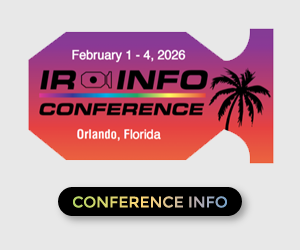Diversification of Your Infrared Business – A Peek Into the Petrochemical & Chemical World
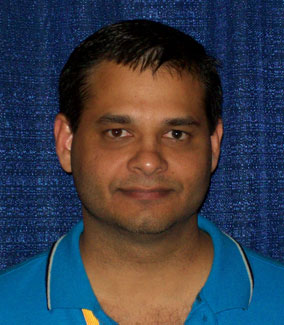 Sonny James
Sonny James
Level III Certified Infrared Thermographer
ASNT NDT Level III IR, MT, PT, UT & RT
Certified Welding Inspector (AWS CWI)
API 510 Certified Pressure Vessel Inspector
Owner, Senior Instructor / Managing Director
East San Fernando, Trinidad & Tobago, West Indies
Ph: 868-653-9343 / 868-657-6572
www.learnndt.com
www.tdlir.com
Abstract
Thermography and related infrared applications have been used for decades in the petrochemical and chemical industries; however, it has been quite a mystery to many on how to penetrate such an industry. The three most asked questions by thermographers are:
- How does one penetrate this industry?
- What can be inspected in a refinery?
- How much money can one actually make in this industry?
I have been successfully involved in this industry for over twenty years as a contractor and consultant and one thing I know for sure is that this industry is very dynamic and never static. This is one of the major reasons that many thermographers find it very difficult or confusing to get into this industry successfully. The rules are always changing and many aspects also move with the current and projected price of crude oil. However, even though it sounds like a daunting task, following a strategic path may increase your chances for a long lasting constant stream of business within this industry.
This paper will address in global terms the above three most asked questions about doing business in the petrochemical and chemical industry. The information will be applicable for doing business in all plants around the world. It will give you a peek into a world that is beyond residential and commercial thermography and you can then decide if the grass is really greener on the other side.
Penetrating the Petrochemical & Chemical Industry as a Thermographer
From this heading you will notice that the terms “petrochemical” and “chemical” industries are segregated. The main reason for this is that most people associate the term “petrochemical” with what they know to be an oil refinery, especially in the United States where oil refineries are plentiful. However, in my opinion, one should not limit themselves or have tunnel vision and focus primarily on oil refineries. It is advisable to see the bigger global picture and expand to chemical processing plants. By diversifying your thermography business to penetrate both petrochemical (oil refineries) and chemical plants, you can ensure a constant stream of jobs and contracts and be more globally marketable and sought after. Some examples of chemical plants that are widespread around the world are methanol, ammonia, melamine and plastic plants. Diversifying in the many different types of chemical plants is a good way to minimize the effects of current low crude oil prices on your revenue stream. Many chemical plants primarily focus on the price of the chemical they are producing; whereas, oil refineries are dramatically affected by crude oil prices and the price at the gas pumps.
Now that we have established our main market to be both petrochemical and chemical plants, the next step is to get approved with these corporations or plants as an infrared thermography contractor or supplier. This is the junction that most thermographers see as their biggest obstacle. The question asked most frequently is: “How can I get into this refinery or chemical plant to provide infrared services?” The short answer is quite simple and very blunt: You cannot get in! A petrochemical or chemical plant would not usually allow any person or company to come in and perform any work for them unless they are on their approved contractor list.
Getting on that approved list is quite simple, providing you have what the plants require. Although the process and requirements may vary from plant to plant and country to country, there are some fundamental commonalities that are the main basis for approval. The following paragraph outlines several of the requirements that you or your thermography business should consider meeting before you seek approval.
The first and foremost important requirement you should have is a service that these plants actually need. Sure, every plant needs thermography and in fact every plant performs thermographic inspections on a regular basis. You should refrain from trying to sell thermography to them because they already know about it and use it all the time. The goal is to convince them that they need your thermography services. What makes you so different than the other half dozen or so thermography providers that are already on their approved list? Why should they add yet another infrared company (you)? Many plants would not entertain adding more service providers to their list unless there is a shortage of what they need or if the providers they currently have cannot perform the job that needs to be done. Therefore, your job is to convince them that you have what they are missing and need, then they will start demanding and requesting that you be added to their list.
Looking below the title of this paper you will notice that there are several abbreviated credentials accompanying the author’s name. This is very important to petrochemical and chemical plants, especially within the field of infrared thermography. Every single petrochemical and chemical plant is having major problems with at least one piece of their critical plant equipment and need help to figure out what the problem is. Once they can troubleshoot the problem, they can properly fix it. In order to troubleshoot the problem they need experts who know and understand the equipment and materials. Therefore, the plant will only seek out an expert thermographer who has the knowledge and experience to bring the added value. Being a certified infrared thermographer is not enough. You must also supplement your thermography qualifications with other important qualifications and should be an expert in your application. The plant will request and want your services if they know you are an expert in the application or equipment, not if you are an expert thermographer.
Also, if you are only providing one service for a single application, unless it is something that is unique and rare, which thermography no longer is, the plants may not have any use for you or your company. Therefore, it may be extremely beneficial to show that you offer a diverse array of expert and professional options to supplement your thermography service.
Now that you have the plants requesting your services, the second step is to meet their entry and approval requirements. This is extremely important as it deals directly with the liability and risk side of doing business with them. It has become standard practice and somewhat of an industry requirement for all service providers to meet what the plants call their “prequalification requirements”. Pretty much every petrochemical and chemical plant will have their own version of a contractor prequalification package or forms. This package will be given to you to complete so that they can assess whether or not you have all the legal requirements they need for you to do business with them. The following are now minimum requirements for doing business with these types of plants:
- You must be a legally registered company
- You must provide them with audited financials to show you are financially stable and are current with all your tax obligations
- You must show them that you have a quality management system or program within your company. This can be ISO-9001 certification; however, it is not usually a requirement for approval, but rather shows them that you follow a documented system for your company.
- You must have a documented and approved health and safety policy and system in place. This is now industry standard for almost all plants with some of them requiring certain national or industry approved certification or accreditation of your company’s health and safety system.
- Some plants now are asking for service providers to have a documented environmental policy or program in place such as ISO-14001
- You must have the required liability insurance and workman’s compensation insurance
- You must gain and show proper approved safety training and orientation certification for all persons entering the plants
The above are now basic global industry requirements that deal directly with liability and risk management for the plants and for you. What does that mean to the “one-man” or small infrared company? Unfortunately, it means that if you fall within this category that you may have to hire more people to create, implement, and even maintain these programs for your company. Usually one or two professionals is sufficient for the creation and implementation of the programs and systems, and they can even be part time or on an as needed basis. It is still a considerable initial expenditure, but can result in long term gains when you finally get approved by several petrochemical and chemical plants around the world.
If this seems all too daunting and expensive a task, then you still have another option to get your foot into the petrochemical and chemical plants. The alternative would be to not try to become an approved infrared service provider with these plants, but rather sell your services to an already approved contractor and work as a sub-contractor. This can be much easier and cheaper, but the downside to this approach is that you may only be hired now and then with no steady revenue stream and you will be limited to contractors that are willing to hire you at your rates and expenses.
What Can Be Inspected In a Refinery?
This is usually the second most common question asked by thermographers wishing to penetrate this industry. The answer, although quite simple, does have a direct impact on the first most common question just previously discussed. The short easy answer to what can be inspected is quite simply everything that you are already inspecting as a thermographer for your commercial and even residential customers, such as:
Electrical Equipment:
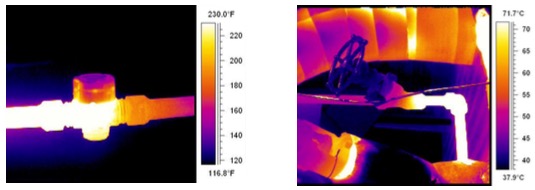
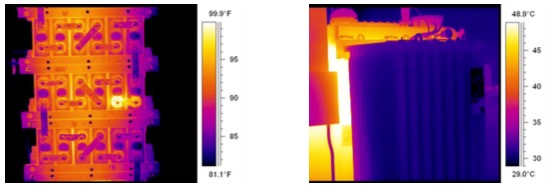
- Image 3: IR UPS Batteries • Image 4: IR Transformer Radiator
Rotating Equipment:
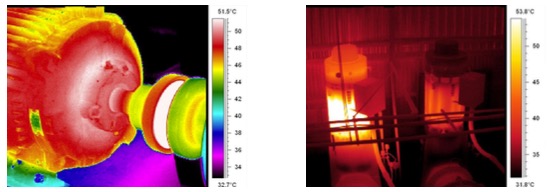
Insulation and Refractory:
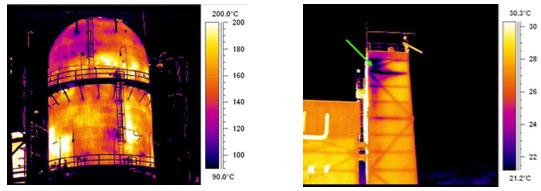
Steam Traps and Valves:

Tank and Vessel Levels:
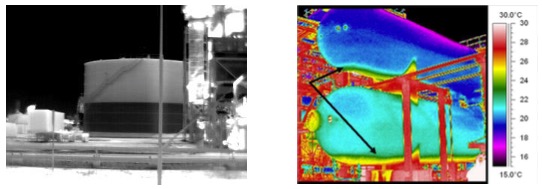
There is, however, the not so short or easy answer to this question in that most thermographers would look at this list of equipment and say to themselves that it is simple standard stuff. For some of the equipment, yes, performing thermography is pretty much standard stuff such as electrical switchgear or motor control centers and motors. However, when it comes to critical equipment inspections and monitoring, there is often nothing standard about it. It is now entering into the realm of specialized and much sought after expert services, and that is what the plants are seeking and would request your services for and demand that you be listed on their approved contractor list. It is your knowledge, expertise and qualifications that will have these plants approve you to work for them. This goes back to the abbreviated credentials listed by the author’s name.
When it comes to providing infrared thermography within the petrochemical and chemical industry, the constant worthwhile revenue stream is not electrical inspection. Electrical infrared surveys are mainly conducted annually, so unless you have contracts with at least ten plants, you will not see regular work or revenue from this application. Rotating equipment such as pumps and motors also fall within this category. This application is usually conducted in-house with plants that have a program in place as it saves on cost. Some plants may opt to hire a full time contractor for rotating equipment monitoring and if that contractor is you, well that is great news. However, there are many infrared contractors offering this service and the pricing is very competitive and this can make you an employee and not an entrepreneur unless you can provide skilled full time manpower to several plants.
The constant worthwhile revenue stream is with the stationary mechanical equipment such as vessels, piping, heaters, and tanks and usually the fired or high temperature equipment. Within these petrochemical and chemical plants, there may be different departments in charge of different equipment that needs to be inspected with thermography. The three common departments are electrical, condition monitoring, and inspection. It is usually the inspection department that yields the highest, most worthwhile, constant revenue stream for thermography.
This brings us again back to the author’s credentials. When dealing with the inspection department, their main goal is to ensure that nothing is hiding within the plant equipment that will result in failure. They must employ an array of inspection and testing methods to seek out these hidden problems and thermography is but one small complimentary tool. The inspection department deals with engineering materials and processes, so in order to perform thermography on the equipment that falls within the inspection department’s jurisdiction, it is imperative that the thermographer is knowledgeable with engineering materials and processes and also other inspection and testing methods. Having the proper training, experience, and qualifications in nondestructive testing (NDT) and other inspection techniques is critical to supplement with thermography. Not having this would greatly diminish your value to the plant. The thermographer’s knowledge and skill of the equipment, materials and processes will greatly affect how the infrared survey is to be performed and how the data are to be correctly interpreted.
How Much Money Can One Actually Make with Thermography in the Petrochemical and Chemical Industry?
This is the third most common question that is asked by thermographers that are contemplating branching off into refineries and chemical plants. The answer is quite simple and is mainly based on how one has executed and implemented the first two questions and what success they have gotten from that.
Pricing and revenue with thermography is no different than all other industries in that it is structured or based on the demand for the service and the amount of supply for that demand. For thermography within refineries and chemical plants, pricing is also based on quality and effectiveness of the service or provider. Because thermography and inspection require skills and competency that not all would possess equally, the thermographers that provide a superior service and outcome would be able to charge more for the same work. This puts them and their company in a separate category from the other infrared service providers who just provide thermography services and rely on the infrared camera’s specifications and imagery as a judge of good work (Point and Shoot).
Having a reputable name in this line of work is crucial to the longevity of your business and the price point that you can charge. It is not uncommon for refineries and chemical plants to pay between two to ten times or more than the standard going rate for their thermography needs. It all comes down to how badly they really need your expert services as compared to the other infrared companies. For the standard yearly electrical infrared surveys you may have to set a competitive price point with minimal margins. However, let’s say a plant wants to monitor process heater tubes that are at the point of failing and only you have the skills and qualifications to provide what the plant needs, then you can call the rates that you see fit for your rare expert services. But please keep in mind that you must still always be worth the cost and expense for the plant.
The beauty of becoming an approved service provider to these plants is that whenever there is a need for thermography, you will be called upon to tender for the job. This is apart from all the other jobs you can get because of your marketing and selling skills, coupled with your expert and superior qualifications to enable you to offer the plant what the others cannot.
Conclusion
Although it may seem a daunting and expensive task to penetrate the local and global petrochemical and chemical industry, it does have it rewards. If you have something these plants need, they will request your services. However, you must also satisfy their prequalification requirements should you want a constant stream of work from them.
Even though there are many refineries and chemical plants around the world, your name and reputation as a qualified expert ends up circulating globally with the more jobs you perform. You will get to realize that although the industry is vast, it ends up being quite a small world for the skilled thermographer in high demand.
So, is the grass really greener on the other side? Yes it is, so long as you are willing to do what it takes to get to the other side and once there you still have to tend and nurture your lawn to keep it green and lush for years to come. As my father and mentor (Edward James) always says: “No One Buys Rotten Fish!”
Advertisement


